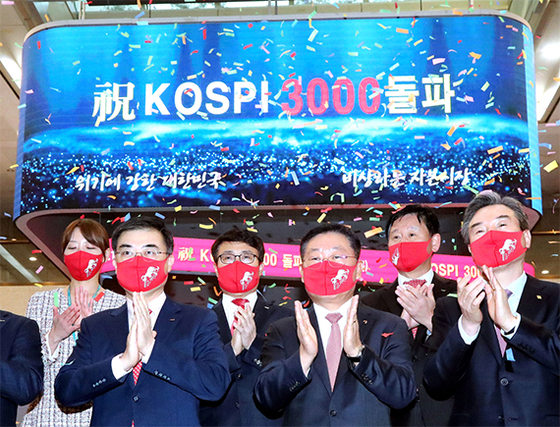
On the 7th, the KOSPI closed at 3031.68, crossing the 3000 line for the first time in history based on the closing price. KRX Chairman Son Byung-doo, Chairman of the Financial Investment Association Na Jae-cheol, and Park Hyun-cheol, CEO of Bukuk Securities (from left to right), are taking commemorative photos at the celebration of the KOSPI 3000 breakthrough held at the Korea Exchange (KRX) in Yeouido, Seoul. Reporter Jang Jin-young
3031.68.
Resolving uncertainty in US Senate elections
Institutions and foreigners are also’lions’
It is a figure that will remain a record in the history of the Korean stock market. On the 7th, 38 years after its inauguration, the KOSPI surpassed the 3000 mark for the first time in history. On this day, KOSPI closed the deal at 3031.68, up 2.14% from the previous day. After jumping to 3,000 units, it surpassed the intraday high (3027.16) on the previous day, when it collapsed to 2000 units, and settled on Hill 3000. It has been 13 years and 5 months since it exceeded the 2000 line in July 2007.
An institutional investor is the best player to achieve this record. An individual investor, aka Donghak Ant, who had been leading the stock market up to the occupation of Hill 3000, began to realize profits and sold KRW 1.17 trillion worth of money, but received it all. In the new year, the institution that sold 3 trillion won worth for 3 consecutive trading days turned to net purchase (1,246 trillion won) on that day. Foreigners (1082 billion won) also joined the’lion’ procession.
The fact that institutions and foreigners actively participated in the purchase was the news of’Blue Wave’ (Democratic Party dominated the President and the US Senate and House of Representatives) from the US politics. This is because the Democratic Party won the US Senate election in Georgia on the 6th (local time), and the Blue Wave became a reality and uncertainty was resolved. On this day, the New York Dow Index rose 1.44% from the previous day, closing the market at a record high of 3829.40.
The reason why the market cheered on Blue Wave is the expectation that a liquidity market could continue. Seung-min Yoo, head of Global Investment Strategy Team at Samsung Securities, said, “As Blue Wave becomes a reality, the expectations that the stock market will bear the fiscal deficit and release more money than fears of tax hikes have been reflected in the stock market.” This is because Joe Biden’s administration is expected to release more money through deficit finance to boost the economy.
With the prospect that the liquidity faucet will not be submerged for the time being, on the 7th, in addition to the semiconductor and information technology (IT) sectors that have played a leading role in the KOSPI market, the stock price has increased evenly with the steel, machinery, and finance sectors. Shares in the steel (2.93%) and machinery (1.96%) sectors, which are representative economically sensitive stocks, jumped 2% a day.
Among the top stocks by market capitalization, LG Electronics (9.1%), LG Chem (8.09%), Hyundai Mobis (7.4%), and SK Telecom (7.8%) rose significantly. Samsung Electronics, which is the’bigger’, closed the market at 8,2900 won, up 0.85% from the previous day. It is from the perspective that liquidity and corporate performance will supply enough firewood to the stock market.
Sang-young Seo, director of investment strategy at Kiwoom Securities, said, “The KOSPI index will be able to rise to 3200 between the end of the first quarter and the second quarter with the power of liquidity released on the market.” He added, “In particular, we are about to announce the results that hold the key to the index direction. We are optimistic as the export growth rate, a leading indicator of corporate profits, is improving.”
Kim Joong-won, head of the investment strategy team at Hyundai Motor Securities, predicted that “in the first half of this year, along with the improvement of the semiconductor industry, the rally of the automobile and chemical industries will raise the index.”
There are also concerns about bubbles (bubbles) following a short-term exponential surge. According to F&Guide, a financial information company, the current KOSPI 12-month leading price-earnings ratio (PER) is 13.73 times as of the 6th. The 10-year average (9.8 times) is, of course, the highest level since July 2000 (14.46 times) when the IT boom occurred. Park Seok-hyun, head of the investment strategy team at KTB Investment & Securities, warned, “It is a proof that the stock price has risen excessively compared to the profits made by the stock market.” In particular, in terms of supply and demand, there are concerns about side effects.
Reporter Yeom Ji-hyun [email protected]
